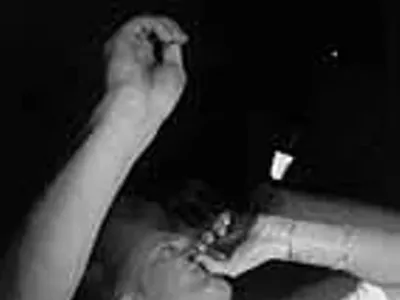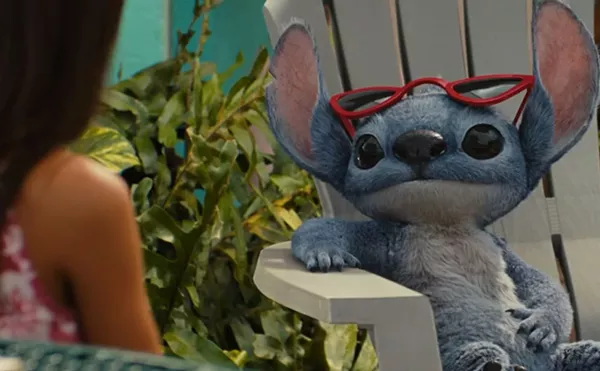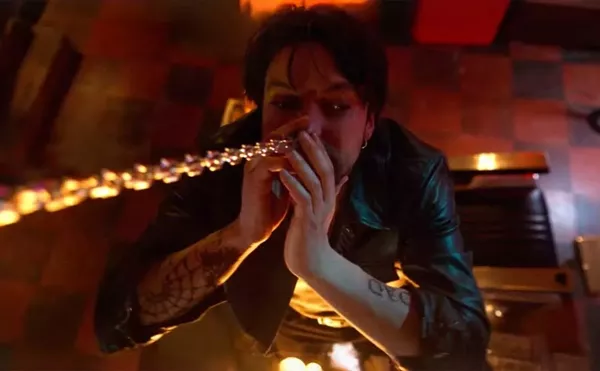
Audio By Carbonatix
[
{
"name": "GPT - Leaderboard - Inline - Content",
"component": "35519556",
"insertPoint": "5th",
"startingPoint": "3",
"requiredCountToDisplay": "3",
"maxInsertions": 100,
"adList": [
{
"adPreset": "LeaderboardInline"
}
]
}
]
Like the rest of Alexander Dumas’ enduring tales, The Count of Monte Cristo translates easily from text to screen. But while more action, adventure and faraway places sometimes make a better movie, they don’t always mean there’s no room for feeling and contemplation.
Director Josée Dayan was selected by Gérard Depardieu to work on the eight-hour miniseries in which he stars – in his TV debut – as Monte Cristo. Dayan has taken this bull of a story by the proverbial horns and given it a lesson in introspection and character depth, making a gratifying shift from fast-paced fairy tale to full-on drama. And, as it turns out, Depardieu is the perfect catalyst.
Under Dayan’s direction, the cameras do not follow fleeing carriages on rainy nights, merchant ships on stormy seas or the firing hands of dueling Frenchmen. Nor are they engrossed in the breathtaking settings of the island of Malta and the port of Vittoriosa, locations meant to imitate 19th century Marseilles – though the latter is sorely missed.
Instead, Dayan allows the story to unfold on the heels of Monte Cristo himself. His true identity is that of escaped convict Edmond Dantés, who also disguises himself as banker Lord Wilmore and the all-too-carnal clergyman Abbé Busoni. Dantés is a most scrutinized character, always caught in close-up, leading the emotional tone of the drama with his facial expressions and brief, torrid dialogues with unsuspecting enemies, leaving the viewer to wonder moment to moment what his next move might be. For it’s his power that moves the story.
The role of an impassioned chameleon is perfect for Depardieu. He is brilliant in this odd production which turns away from the story’s obvious and inherent appeal to focus on the personal struggle of a man who, with a fortune bequeathed to him by a dead inmate, decides to play vengeful God and almost succeeds. In this version, we read the story not in two halves of a life – imprisonment and freedom – but in two people within one man.
The young sailor Dantés, who was wrested from the arms of his one true love, Mercedes (Ornella Muti), during their engagement celebration and arrested for treason, is hardened during 20 miserable years of confinement at Chateau d’lf. Unwilling to admit his consuming lust for revenge, he creates another personality to carry out his plans for justice, which Monte Cristo does with formidable force, only curbed by a measure of neurotic self-righteousness.
He has his weak moments. When he takes an interest in the quirky, food-addicted widow Camille de la Richardais, for instance. On an evening when a servant announces that Camille must dine on watercress soup and vegetables because they cannot afford meat, Monte Cristo fills her dining room tables with delicacies in order to woo her. He succeeds, knowing he cannot return her love because his heart still belongs to Mercedes, the woman he both longs for and despises for marrying a rival.
There’s nothing like a cast of stationary characters to highlight the desperate mobility of Monte Cristo who, in the purity of his mission, possesses almost paranormal powers. This alter ego is a chemist, magician, master of disguise and psychologist, who embodies the dark avenger so completely that he leaves Dantés free to lament, "I do not wish to become that man."
Dayan’s vision is brave and intriguing, never faltering from head-on confrontations with universal questions, like where is God when you need him? And she achieves this with a style and polished subtlety that transcends the fact that we are hearing it all in French with English subtitles.
But there are a few distracting flaws in "The Count of Monte Cristo." And as we learn from the story itself, sometimes small oversights can lead to greater problems in the greater scheme of things.
When Dantés disguises himself as a priest, he uses a cropped brown wig to cover his blonde locks and a rubber nose to change the appearance of his face. Depardieu’s nose, which is rather large to begin with, looks like a flesh-colored doorknob with this ridiculous piece of rubber stuck to it. And since such false fronts appear many times throughout the miniseries, the blunder is hard to forget.
The second problem is due to some overly adventurous casting. In the first episode, Dantés and Mercedes are played by the son and daughter of Depardieu and Muti, which makes for an interesting dynamic, especially if you pay attention to the credits and know this in advance. It works rather well, as the younger actors resemble their actor parents enough to pull it off.
Unfortunately, Dayan doesn’t leave it at that. She casts Depardieu Sr. as Père Dantés in the engagement party scene without much alteration to his appearance. It doesn’t quite work, as the viewer is likely to believe that Père Dantés is the aging prisoner seen soon after at Chateau d’lf.
But costume problems and casting faux pas aside, "The Count of Monte Cristo," which premieres on Bravo, Monday, June 21 at 8 p.m., is a stunning piece of work, even if it offers more eyes and strange faces than landscapes and duels to gaze at.





